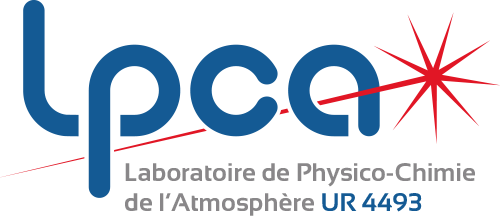-
Energy and Environment
-
Societal and economic transition & Risk management
-
Transport and Mobility
Laboratory of Physico-Chemistry of the Atmosphere (LPCA)
Research unit - UR 4493
The laboratory carries out basic and applied research, in physics and chemistry, to better understand the impact of human activities on the environment, particularly in the area of the atmosphere.
The LPCA is organized into two themes:
1- Physico-Molecular Chemistry and Instrumentation
2- Support for Environmental Transitions
-
Gaël Mouret
Director
189A avenue Maurice Schumann
Maison de a Recherche en Environnement Industriel Maison de a Recherche en Environnement Industriel 2
59140 Dunkerque
https://lpca.univ-littoral.fr/

Effectif
Effectif total : 61
Personnel de recherche : 22
Personnel d'appui à la recherche : 8
Skills
• Air pollution and atmospheric dynamics analysis
• Modelling of transport, dispersion and chemistry of tropospheric pollutants
• Synthesis, characterization of inorganic materials (chalcogenide glasses, etc.) and associated applications (energy storage, etc.)
• Physico-chemical characterization of particles released into the environment
• Development of chemical sensors for environmental and industrial process control
• Development of new optical techniques for on-site gas testing and/or analysis
• Remote Sensing Air Pollution (LIDAR) Studies and Sensor Network
• Photo-inscription in glassy materials
• CV reactivity in atmospheric simulation chamber
Example(s) of projects
Example(s) of publications
Collaborations/Partners/Scientific clients
• Universities : Lille, Orsay, Créteil, Dijon, Nice, Bordeaux, Rennes
• Institutes : Synchrotron SOLEIL, ESRF, ONERA, IMT
International
China : AIOFM; Russia : Moscow, St Petersburg, Tomsk Universities; Japan : Kyoto, Tokoshima Universities; USA : JPL Pasadenas, Harvard Smithonian; Europe : Radboud-NL, Cork-IRL, Padova-IT, Köln-DE, Gand-B
Services provided
Consulting services
• Spectrometry: Mössbauer, absorption (FTIR, THz, millimeter)
• SEM-GEF-TSEM electron microscopy
• Techniques for analyzing regulated pollutants, VOCs and aerosols
• Frequency comb and femtosecond laser
• Lasers, optical and opto-electronic techniques
• LIDAR remote sensing (aerosols, Doppler), SODAR and RADAR
• Micro-meteorology, 3D ultrasonic anemometry
• Photo-inscription in glassy materials
• Atmospheric simulation chamber.
Affiliated institutions / organisations
Equipex/EquipEx+/ESR
Doctoral schools
Regional strategic areas of activity
- Energy and Environment
- Observation, monitoring and management of the environment
- Societal and economic transition & Risk management
- Industrial and territorial ecology
- Transport and Mobility
- Reduction of pollution and energy consumption
